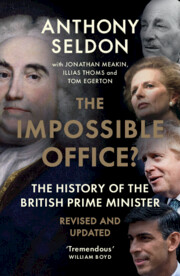Book contents
- The Impossible Office?
- Works by Anthony Seldon
- The Impossible Office?
- Copyright page
- Dedication
- Contents
- Preface
- Chapter 1 The 300th Anniversary Bookend Prime Ministers
- Chapter 2 A Country Transformed, 1721–2024
- Chapter 3 The Liminal Premiership
- Chapter 4 The Transformational Prime Ministers, 1806–2024
- Chapter 5 The Powers and Resources of the Prime Minister, 1721–2024
- Chapter 6 The Constraints on the Prime Minister, 1721–2024
- Chapter 7 The Eclipse of the Monarchy, 1660–2024
- Chapter 8 The Rise and Fall of the Foreign Secretary, 1782–2024
- Chapter 9 The Rise, and Rise, of the Chancellor of the Exchequer, 1660–2024
- Chapter 10 The Impossible Office?
- Acknowledgments to the First Edition
- Notes
- Bibliography
- Index
Chapter 7 - The Eclipse of the Monarchy, 1660–2024
Published online by Cambridge University Press: 14 March 2024
- The Impossible Office?
- Works by Anthony Seldon
- The Impossible Office?
- Copyright page
- Dedication
- Contents
- Preface
- Chapter 1 The 300th Anniversary Bookend Prime Ministers
- Chapter 2 A Country Transformed, 1721–2024
- Chapter 3 The Liminal Premiership
- Chapter 4 The Transformational Prime Ministers, 1806–2024
- Chapter 5 The Powers and Resources of the Prime Minister, 1721–2024
- Chapter 6 The Constraints on the Prime Minister, 1721–2024
- Chapter 7 The Eclipse of the Monarchy, 1660–2024
- Chapter 8 The Rise and Fall of the Foreign Secretary, 1782–2024
- Chapter 9 The Rise, and Rise, of the Chancellor of the Exchequer, 1660–2024
- Chapter 10 The Impossible Office?
- Acknowledgments to the First Edition
- Notes
- Bibliography
- Index
Summary
In this chapter, we explore how the transfer of power between the monarch and the prime minister occurred, when it happened, how the monarchy survived, the importance it still has in Britain, and how far the prime minister has effectively become the head of state as well as head of executive. The monarchy continued to exercise real authority for the first 200 years of the prime minister’s existence and beyond, up to today. The rebalancing of power was painful, faltering, and contested. Scratch below the surface, and the relationship between head of state and head of government has been far from settled. The continued existence of an independent prime minister was not a given in the eighteenth century. The continued existence of the monarchy until today has not been a given either. It had been abolished in Britain in 1649, as it was in France in 1792 (and 1848 and 1870), Germany in 1918, and Italy in 1946. It would have been vulnerable in Britain had there been military defeat or successful revolution: its continuation into the future is not assured. Monarchies are going out of fashion. Britain’s has held strong.
Information
- Type
- Chapter
- Information
- The Impossible Office?The History of the British Prime Minister - Revised and Updated, pp. 275 - 312Publisher: Cambridge University PressPrint publication year: 2024
